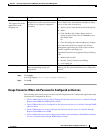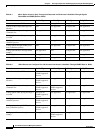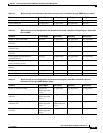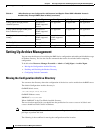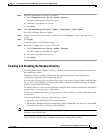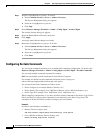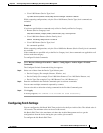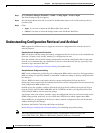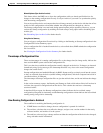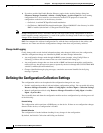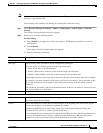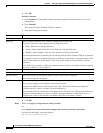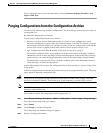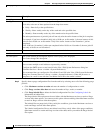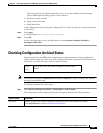
8-24
User Guide for Resource Manager Essentials 4.1
OL-11714-01
Chapter 8 Archiving Configurations and Managing Them Using Archive Management
Understanding Configuration Retrieval and Archival
Step 1 Select Resource Manager Essentials > Admin > Config Mgmt > Archive Mgmt.
The Fetch Settings dialog box appears.
Step 2 Provide the Job Result wait time in seconds in the Maximum time to wait for Job results per device
(seconds) field.
Step 3 Click:
• Apply, if you want to submit the Job Result Wait Time entered.
• Cancel if you want to cancel the changes made to the Job Result Wait Time.
Understanding Configuration Retrieval and Archival
RME supports five different ways to trigger the retrieval of configuration files from the device for
archival purposes.
Schedule Periodic Configuration File Archival
RME will archive both the startup and running configuration files for all devices at the scheduled time
(6-hourly, 12-hourly, daily, weekly, monthly), as configured by the user.
Since this method collects the full running configuration and startup configuration files for the entire
network, we recommend that you schedule this to run at no more than once per day, especially if the
network is large and outside the LAN.
See Defining the Configuration Collection Settings for further details.
Schedule Periodic Configuration Polling
RME can be configured to periodically poll configuration MIB variables on devices that support these
MIBs according to a specified schedule, to determine if either the startup or running configuration file
has changed.
If it has, RME will retrieve and archive the most current configuration file from the device.
Polling uses fewer resources than full scheduled collection, because configuration files are retrieved only
if the configuration MIB variable is set.
On IOS devices the variables ccmHistoryRunningLastChanged and ccmHistoryStartupLastChanged
from the CISCO-CONFIG-MAN-MIB MIB, and on CATOS the variable sysConfigChangeTime from
CISCO-STACK-MIB are used to detect the change.
Any change in the value of these variables causes the configuration file to be retrieved from the device.
SNMP change polling works only in case of IOS and CATOS devices which support these MIBs.
If these MIBs are not supported on the devices, then by default, configuration fetch will be initiated
without checking for the changes.
By default, the Periodic Collection and Polling are disabled.
See Defining the Configuration Collection Settings for scheduling the periodic polling.
Note The Syslog application triggers configuration fetch, if configuration change messages like
SYS-6-CFG_CHG, CPU_REDUN-6-RUNNING_CONFIG_CHG etc., are received.




